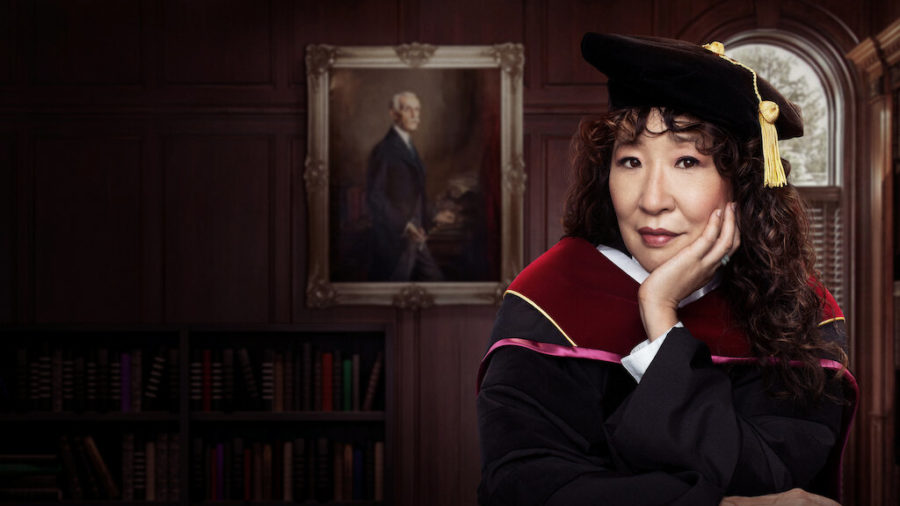Netflix’s “The Chair” is hard to call satire
Sandra Oh stars as Professor Ji-Yoon Kim in Netflix’s “The Chair”
September 24, 2021
In the first few minutes of “The Chair,” we witness Dr. Ji-Yoon Kim (Sandra Oh) striding gleefully across the stone paths of the fictional Pembroke University towards her new office. If the office’s wooden paneling, emerald green sofas or Vivaldi trumpets in the background weren’t enough indication, the sign on the front door emblazoned with her name and the title, “Chair, Department of English,” declares her position and authority. This “Asian lady teaching Emily Dickinson” has reached a career high, marked by her relaxed exhale as she settles into her large office chair—until it promptly falls apart beneath her. That pratfall, though amusing, is an ominous indication of just how poor of a state her department and Pembroke University itself are in.
Ji-Yoon now finds herself caught between a rock and hard place (if not multiple) as she attempts to pave the way for her department’s future. Instead, she finds herself hindered, whether it be by a dean fixated on his endowment and reputation, a gifted but out-of-touch faculty (with Holland Taylor as a feminist Chaucer scholar consigned to the basement, and Bob Balaban as a stubborn Melville connoisseur forced into adult diapers) or a hapless, widowed philosopher (Jay Duplass) whose erraticism lands him in hot water, forcing Ji-Yoon to start coddling. Meanwhile, discontent is mounting among the younger generation, whose own situations demonstrate the level of disconnect that Ji-Yoon must grapple with.
In just six episodes, creators Amanda Peet and Annie Julia Wyman attempt to cover all the bases on a life in academia, from the potential toxicity that is birthed from it, to the struggle of those in power, along with balancing lives of their own. The largest question that looms, however, is how does it all turn out in the end for the college students, especially if the viewers are students themselves?
Starting with aspects I enjoyed, the performances of Oh (of “Grey’s Anatomy” and “Killing Eve” fame) and Taylor were quite memorable. With all the wit, comedy and nuanced characterizations found in Oh’s Ji-Yoon and Taylor’s Joan, I’d say it was one of the largest determining factors to just how interesting this show was to me. But in the end, as the camera zooms out on the campus quad and Vampire Weekend kicks up as the credits roll, it seemed to me that the expected critique of life in academia was rather tame.
What I found was that despite its intentions, “The Chair” is not the satirical skewering of power and academic life it tries to be. While watching Ji-Yoon unable to balance her chairship’s demands with making changes makes for a promising premise, the show loses its focus along the way.
The plot gets muddled due in part to Duplass’s scruffy widower, Bill, who is another example of Ji-Yoon cleaning up others’ messes rather than achieving her own goals, in particular, Bill’s refusal to apologize for an incautious Nazi salute during a lecture on absurdism and fascism. It’s here where the satirization of cancel culture (as it so often gets thrown into the ring nowadays) seems lost, with little to no focus on student perspective or feelings as this ordeal occurs.
Most notably, Bill’s own teaching assistant, Lila (Mallory Low), is caught up in the entire situation, yet her predicament—and that of the students—are overlooked by Ji-Yoon and Bill, who are busy duking it out over Bill’s behavior and his job. Dr. Yaz McKay (Nana Mensah), another professor in the English department, faces a similar ordeal with her track to tenure getting sidelined by her fellows and her boss, becoming discontented with the roadblocks. “You are going to be the first tenured Black woman in this department,” Ji-Yoon says to assure her. “That’s why I’m leaving,” Dr. McKay fires back.
It’s not that the show doesn’t do a good job of interpreting the struggles of staying at the top, but the show could have used some extra real estate to aptly demonstrate the issues in college politics and the social topics that have become so hotly debated in the media sphere and on campuses across the country, even here at Case Western Reserve University.
“The Chair” comes close to being perfect. It’s an easy-to-watch workplace dramedy whose leading cast makes it a ball, but to say it’s an on-target satire might be pushing it.
“The Chair” is available to stream now on Netflix.



